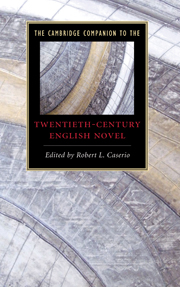Book contents
- Frontmatter
- Introduction
- 1 The art of English fiction in the twentieth century
- 2 The British Empire and the English modernist novel
- 3 Realism and rebellion in Edwardian and Georgian fiction
- 4 The Great War in English fiction
- 5 Postwar modernism in the 1920s and 1930s: The mammoth in the basement
- 6 Regionalism in English fiction between the wars
- 7 Ireland and English fiction
- 8 Feminist fiction
- 9 Working-class fiction across the century
- 10 World War II, the welfare state, and postwar “humanism”
- 11 The Windrush generation
- 12 History in fiction
- 13 Postmodernisms of English fiction
- 14 Detectives and spies
- 15 The post-consensus novel: Minority culture, multiculturalism, and transnational comparison
- 16 An absurd century: Varieties of satire
- 17 The other side of history: Fantasy, romance, horror, and science fiction
- Further reading
- Index
9 - Working-class fiction across the century
Published online by Cambridge University Press: 28 July 2009
- Frontmatter
- Introduction
- 1 The art of English fiction in the twentieth century
- 2 The British Empire and the English modernist novel
- 3 Realism and rebellion in Edwardian and Georgian fiction
- 4 The Great War in English fiction
- 5 Postwar modernism in the 1920s and 1930s: The mammoth in the basement
- 6 Regionalism in English fiction between the wars
- 7 Ireland and English fiction
- 8 Feminist fiction
- 9 Working-class fiction across the century
- 10 World War II, the welfare state, and postwar “humanism”
- 11 The Windrush generation
- 12 History in fiction
- 13 Postmodernisms of English fiction
- 14 Detectives and spies
- 15 The post-consensus novel: Minority culture, multiculturalism, and transnational comparison
- 16 An absurd century: Varieties of satire
- 17 The other side of history: Fantasy, romance, horror, and science fiction
- Further reading
- Index
Summary
Toward a theory of working-class fiction
Since Ian Watt's groundbreaking work on the development of the novel, there is overwhelming evidence that the form has been from its inception the preserve of the middle class, despite its being extended or qualified to include subgenres. However, this chapter argues that working-class fiction can be distinguished from a dominant tradition in the history of the novel. Working-class fiction will be defined here by the way that it responds, in a peculiarly local and vital way, to a lived experience that middle-class novels have only been able to observe. Working-class fiction thus sees beyond the limited horizon of bourgeois knowledge to articulate the actual experience and the felt consequences of industrialization. Shaped and determined by the processes of production itself, working-class writing is a product of a distinct form of consciousness.
As the Marxist philosopher Georg Lukács has argued, such consciousness is able to perceive and hence disclose the true nature of a society which reduces all relations and values to those of the commodity, and insists that “the principle of rational mechanisation and calculability must embrace every aspect of life.” Commodification integrates social being and commodities into a “specialized process . . . in which [the worker] is no more than a cipher reduced to an abstract quantity, a mechanised and rationalised tool.” Working-class life-experience and consciousness embodies a dialectic - a consciousness of itself, the subject, as object - that comprehends the condition of “society as a whole” because the working class typically “reveals in all its starkness the dehumanised and dehumanising function of the commodity relation” (p. 92).
- Type
- Chapter
- Information
- The Cambridge Companion to the Twentieth-Century English Novel , pp. 131 - 145Publisher: Cambridge University PressPrint publication year: 2009
- 1
- Cited by



